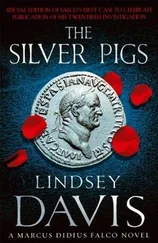Lindsey Davis - The Iron Hand of Mars
Здесь есть возможность читать онлайн «Lindsey Davis - The Iron Hand of Mars» весь текст электронной книги совершенно бесплатно (целиком полную версию без сокращений). В некоторых случаях можно слушать аудио, скачать через торрент в формате fb2 и присутствует краткое содержание. Жанр: Исторический детектив, на английском языке. Описание произведения, (предисловие) а так же отзывы посетителей доступны на портале библиотеки ЛибКат.
- Название:The Iron Hand of Mars
- Автор:
- Жанр:
- Год:неизвестен
- ISBN:нет данных
- Рейтинг книги:5 / 5. Голосов: 1
-
Избранное:Добавить в избранное
- Отзывы:
-
Ваша оценка:
- 100
- 1
- 2
- 3
- 4
- 5
The Iron Hand of Mars: краткое содержание, описание и аннотация
Предлагаем к чтению аннотацию, описание, краткое содержание или предисловие (зависит от того, что написал сам автор книги «The Iron Hand of Mars»). Если вы не нашли необходимую информацию о книге — напишите в комментариях, мы постараемся отыскать её.
The Iron Hand of Mars — читать онлайн бесплатно полную книгу (весь текст) целиком
Ниже представлен текст книги, разбитый по страницам. Система сохранения места последней прочитанной страницы, позволяет с удобством читать онлайн бесплатно книгу «The Iron Hand of Mars», без необходимости каждый раз заново искать на чём Вы остановились. Поставьте закладку, и сможете в любой момент перейти на страницу, на которой закончили чтение.
Интервал:
Закладка:
'The legionary commander Munius Lupercus had been sent along with other presents to Veleda, an unmarried woman who enjoyed wide influence over the tribe of the Bructeri.'
Tacitus, HistoriesXLIII
It was hard to believe that Rome had once laid claim almost as far as the River Elbe. Drusus, his brother Tiberius, and his son Germanicus, had slogged away for years, trying to enclose a huge bight of Free Germany. They had used a double-ended pincer movement, invading from Moguntiacum in the south, and across the northern delta flats. Varus and his ineptitude had ended that. Some traces still remained from when Rome had fooled herself that she controlled these wild wetlands. Instead of returning to Batavodurum, we took the Drusus Canal from the mouth of the Rhenus to Lake Flevo, partly because the old canal was a wonder we might have no other chance to see.
We landed again. South of the lake there was little trace of the Roman occupation that had ended sixty years earlier. Lentullus, who was permanently impatient, asked when we would come to the first town. I explained, somewhat roughly, that there were no towns. It started raining. A horse stumbled and pulled a hamstring. We had to unpack and leave it, still within sight of the lake.
'So what do we know about the Frisii, Marcus Didius?' Justinus chaffed, as we surreptitiously made our first camp.
'Let's tell ourselves they are a placid, ranching, cereal- growing people with a yearning for the sea – and hope that their cattle are more dangerous than they are. The Frisii were conquered – no, I'll rephrase that tactfully – they were settled on Roman terms agreed by our esteemed Domitius Corbulo. That's quite recent history.' Corbulo was a real soldiers' general; one who made Petilius Cerialis look like a reject from the Roman fire brigade.
'So where were they in the rebellion?'
'Oh, keen supporters of Civilis, naturally!'
We had not yet reached the forest and were still in flat coastal country. To us it seemed a low, drear, dull land, lacking features as much as it lacked warmth. But perhaps if you were born in a byre there, Batavia and Frisia were a challenge, with their endless fight against floods from rivers, lakes and seas, and their wide stirring vistas of open grey skies.
Much of this region seemed deserted. There were few of the settlements that flourished in Gaul. Even Britain was a populous, companionable place apart from its wildest parts. Germany, however, wanted to be different. All we saw were a few isolated houses, or at best crude huddles of huts and byres.
Here the people matched their reputation and lived a solitary life. If a tribesman could see his neighbour's smoke, he grew twitchy. He would want to ride over there, not for a meal and a game of dice, but to kill his neighbour, enslave his family, and plunder his goods. The presence of Romans just across the great river could only have made matters worse. Now the tribes had the decent excuse of trade to make warlike attacks on each other, seizing prisoners to meet the endless demand for slaves.
'Sir, will they try and capture us, then?'
'They know they can't sell Roman citizens back to Rome as slaves.'
'So what, sir?'
'They'll kill us, probably.'
'Is it true the barbarians are all head-hunters?' jested Ascanius.
'If it is, they'll have no trouble spotting your big noddle anyway.'
I was growing concerned about the pedlar. Dubnus appeared inexplicably restless. I had told him he could trade with the natives, yet he made no attempt to do so. When a man ignores a chance to pursue his living, I always deduce he has hopes of some bounty – and bounties are usually suspect in origin.
On one of my turns to be kind to him, I asked about trade. I knew that the great routes into the interior of northern Europe ran along the River Moenus from Moguntiacum, up the Lupia, and around the Baltic amber coast.
The Moenus and Lupia traders, along with others who came up from the Danube, tended to converge in a market among the Bructeri, where we ourselves were heading. 'I've done them all,' the pedlar said. 'All except the sea. I won't sail. I'm a loner. Sometimes I just prefer to wander on my own.' Was that why he hated being in our group?
'Is there a good trade with the tribes, Dubnus? Do they buy or sell?'
'Sell mostly. Converting their plunder.'
'Which is what?'
He was feeling uncooperative. 'Anything they may have snatched from someone else.'
'All right. So what do they snatch?'
'Oxhides and furs. Drinking-horns. Amber. Ironwork.' Dubnus must still be annoyed at being taken into custody and dragged along with us. He grinned evilly. 'In this area they still have a good stock of Roman armour and gold!'
He was trying to rile me. I knew what he was getting at. Twenty thousand men had perished with Varus – along with the field army's complete equipment, the commander's personal treasure, and boxes of soldiers' pay. Every household between the Ems and the Weser must have been living comfortably for decades off pickings from the massacre. Every time they lost a calf, all they had had to do was brave the whitening stacks of bones and gather up a breastplate to use in barter for a new animal.
I asked evenly, 'What do they like to buy? I've heard there's a fairly constant market for good Roman bronze and glass.'
'No tribal chief who takes a pride in his reputation is buried without a silver tray by his head and a full formal Roman drinking set.'
'I expect you can always find buyers for brooches or pins?'
'Trinkets. They like silver. They love coins, though only the old ones with milled edges.' Nero had devalued the currency the year before the Great Fire of Rome. I preferred the old coins too – they felt more substantial. In Rome the State guarantee held just as good for the new adulterated sesterces, but out here the weight of the metal would count.
'Do the German tribes use money?'
'Only when they barter with traders.'
'Coins are more for status and ornament? And is it true they ban imports of wine?'
Dubnus inclined his head. Not completely. But this isn't Gaul, where they'd give you their mother in exchange for a drink. Fighting is the serious business.'
'I thought they loved feasting. What do they drink?'
'Mead. Fermented mixes of barley and wayside fruits.'
'Pretty resistible! So, the German tribes tolerate our fancy goods, but Rome hasn't much else to offer them. They hate what we regard as civilised arts: conversation at the bathhouse, harmonious formality – a good binge on the Falernian.'
'They just hate Rome,' said Dubnus.
I gave him a sideways glance. 'You're a Ubian. Your tribe came from over the Rhenus once, so you have Germanic roots. What about you?'
'A man has to earn a living.' He let me hear an undertone of contempt.
But the conversation ended there, because we rode into our first group of Frisians. We drew to a halt like polite visitors. They approached us cautiously.
They were bare-headed – red-headed – blue-eyed, tunicked and cloaked in sombre wool, the way they were supposed to be. We had been telling ourselves that chroniclers exaggerated everything. Maybe it was the Germanic angry temperament they had chosen to misreport.
'Step up, Falco!' Justinus commanded cheerfully. 'Time for this famous plan of yours.'
We all breathed with more care than normal. I hauled Dubnus forwards. 'Please tell these gentlemen we are travelling to pay our respects to Veleda.' He scowled, then said something. I did catch Veleda's name.
The tribune's dog proved our best ally. He rushed up to each Frisian, barking, wagging his rump and trying to lick faces joyfully. They could see that no one who brought such a hopeless hunting hound could have hostile intentions, and that claiming our scalps would be an insult to their manhood. Fortunately, the pup forgot to nip anyone that day.
Читать дальшеИнтервал:
Закладка:
Похожие книги на «The Iron Hand of Mars»
Представляем Вашему вниманию похожие книги на «The Iron Hand of Mars» списком для выбора. Мы отобрали схожую по названию и смыслу литературу в надежде предоставить читателям больше вариантов отыскать новые, интересные, ещё непрочитанные произведения.
Обсуждение, отзывы о книге «The Iron Hand of Mars» и просто собственные мнения читателей. Оставьте ваши комментарии, напишите, что Вы думаете о произведении, его смысле или главных героях. Укажите что конкретно понравилось, а что нет, и почему Вы так считаете.












